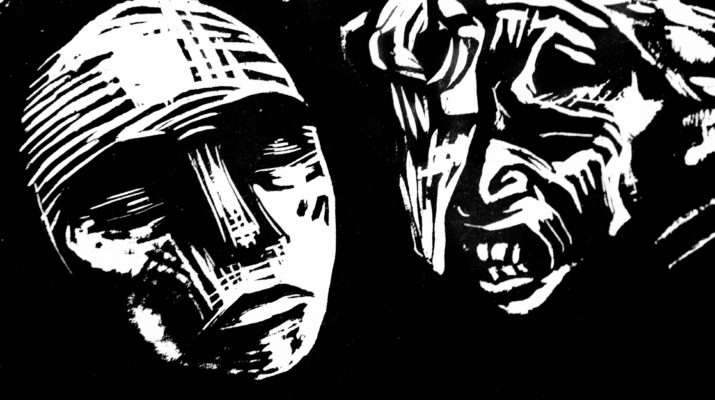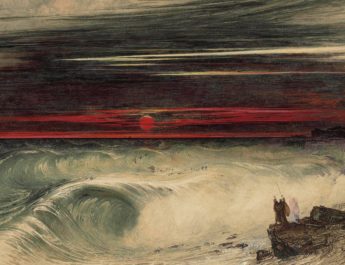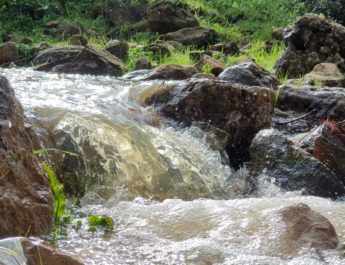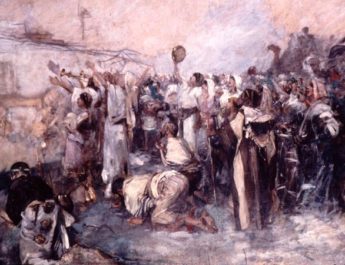Lamentations 3:1-9, 19-24
Dark Saturday ABC
1 I am oneA who has seenB afflictionC
under the rodD of God’s wrath;E
A “one” = geber. From gabar (to be strong or mighty; to prevail or to be insolent) This is man, warrior, a person generally, or a valiant person.
B “seen” = raah. This is to see in a literal or figurative sense so stare, advise, think, view.
C “affliction” = oniy. From anah (to be bowed down; humility or being browbeaten, oppressed, afflicted, or depressed; literal or figurative – depressed in mood or circumstance). This is misery, poverty, or affliction.
D “rod” = shebet. This is a rod, staff, club, scepter, dart, or tribe. Literally a stick that can be used for punishing, writing, fighting, walking, ruling; thus, used figuratively for a clan.
E “wrath” = ebrah. From eber (the region beyond, passage, quarter, opposite side; generally the east); from abar (to pass over, pass through, or pass by; cross over or to alienate; used for transitions). This is overflow or a passionate outburst. So, fury, anger, or rage.
2 he has drivenF and broughtG me
into darknessH without any light;I
F “driven” = nahag. This is to drive as in driving flocks, but also driving in animal or vehicle like a chariot. It can mean to carry away, lead, drive away, proceed, or guide. It can also relate to behavior and what one is accustomed to.
G “brought” = halak. This is go, come, walk. It is walk literally and figuratively and includes people and animals. It can be used figuratively for one’s moral life – how we walk according to God’s way or against it. It can also refer to the walk of life as in the course one’s life takes, the choices we make, etc.
H “darkness” = choshek. From chashak (to be or become dark). This is literal darkness is contrast to light. Figuratively, it can be obscurity, sorrow, misery, blindness, wickedness, destruction, death. It can also be hiding places. Additionally, it can mean judgment, mourning, ignorance, evil, or sin.
I “light” = or. From or (to be or become light). This is light, sun, sunshine, dawn, or daylight. Figuratively, it can refer to light from instruction, light of a face (that is to say one that is cheerful or finds favor). It can refer to prosperity or salvation; a light that guides, a light eternal from Zion.
3 against me alone he turnsJ his hand,K
again and again,L allM dayN long.
J “turns” = shub. To turn back, return, turn away – literally or figuratively. Doesn’t necessarily imply going back to where you started from. This is also the root verb for the Hebrew word for repentance “teshubah.”
K “hand” = yad. This is hand, ability, power. Hand in a literal sense, but also what one can do or the means by which one does it.
L “again and again” = haphak. This is to turn, overturn, change, return, turn over, pervert.
M “all” = kol. From kalal (to complete). This is all or every.
N “day” = yom. Root may mean being hot. This is the day in a literal or figurative sense. It can also mean birth, age, daylight, continually or other references to time.
4 He has made my fleshO and my skinP waste away,Q
and brokenR my bones;
O “flesh” = basar. From basar (being a messenger, publish, carry preach; properly, this is being fresh, rosy or cheerful as one bearing news). This is flesh, the body, fat, skin, self, nakedness, humankind, or kin. It can also refer to private parts.
P “skin” = or. Perhaps from ur (to be made naked, exposed, or bare). This is skin, hide, or leather. It can also refer to a body.
Q “made…waste away” = balah. 17x in OT. This is to grow old, wear out, consume, waste, enjoy, fail, decay.
R “broken” = etsem. From atsam (vast, numerous, strong; to close one’s eyes, to make powerful; to break bones). This is self, life, strength, bone, or substance.
5 he has besiegedS and envelopedT me
with bitternessU and tribulation;V
S “besieged” = banah. This is to build, make, set up, restore, repair, or obtain children. It is to build literally or figuratively.
T “enveloped” = naqaph. 19x in OT. This is to strike, cut down, surround, destroy, corrode, knock together, or enclose. It can be to surround as a guard or like the sea. It can meaning coming to the end of a festival time or enclosing in a net or trap.
U “bitterness” = rosh. 12x in OT. From rosh (head, captain, or chief; excellent or the forefront; first in position or in statue or in time). This is bitterness, gall, poison. It can be used of a plant or of venom from a snake.
V “tribulation” = telaah. 4x in OT. From laah (to be weary or exhausted, parched, faint, or tired; to be impatient or have a hard time; figuratively, being grieved or disgusted). This is trouble, distress, or weariness.
6 he has made me sitW in darknessX
like the deadY of long ago.Z
W “made…sit” = yashab. This is to sit and so to remain and so to dwell. It is sitting for any reason – as a judge, in order to ambush, or just sitting quietly. Causatively, this can mean settling or marrying. This can also mean continue, endure, or establish.
X “darkness” = machshak. Related to “darkness” in v2. 7x in OT. From chashak (see note H above). This is darkness or a place that is dark.
Y “dead” = mut. This is to die in a literal or figurative sense. It can also refer to being a dead body.
Z “long ago” = olam. This is a long scope of time whether in the past (antiquity, ancient time) or in the future (eternal, everlasting).
7 He has walledAA me about so that I cannot escape;BB
he has put heavyCC chainsDD on me;
AA “walled” = gadar. 10x in OT. To build a wall or wall off, mason, repair, hedge, enclose. This is to wall in or wall around.
BB “escape” = yatsa. This is to go or come out, bring forth, appear. It is to go out in a literal or figurative sense.
CC “put heavy” = kabad. To be heavy, weighty, or severe. It can also be positive abounding in, rich, or honorable. The Hebrew word for “glory,” kabod, is taken from this root.
DD “chains” = nechosheth. Perhaps from nechushah (copper, bronze, brass – something made from this metal like a coin or fetter; something that is considered base in contrast to gold or silver.; from nachush (made of bronze or brass, coppery; figuratively, hard); from nachash (to divine, interpret omens, learn from experience, observe; to hiss). This is bronze, copper, steel, brass or something made from copper. So, it could be a coin or chains. It can also figuratively mean something considered lesser in contrast to gold or silver.
8 though I callEE and cry for help,FF
he shuts outGG my prayer;HH
EE “call” = zaaq. This is to cry or call out. It can be a call to assemble or gather together. By analogy, this could refer to a herald who announces a public gathering. It could also be a shriek from pain or danger.
FF “cry for help” = shava. This is crying or shouting aloud, generally seeking freedom from some kind of trouble.
GG “shuts out” = satham. 15x in OT. This is closed, stopped up, or shut up. This can imply repairs or figuratively it can mean keeping secret.
HH “prayer” = tephillah. From palal (to judge for oneself or in an official capacity; to pray or make supplication, to entreat). This is prayer or intercession. It can also be a hymn.
9 he has blockedII my waysJJ with hewn stones,KK
he has made my pathsLL crooked.MM
II “blocked” = gadar. Same as “walled” in v7. See note AA above.
JJ “ways” = derek. From darak (to tread, march, to walk. Can also mean affixing a string to a box since one needs to step on it to bend it in the process; so also an archer). This is a road as a thing that is walked on. Can be used figuratively for the path that one’s life takes or how one chooses to live one’s life.
KK “hewn stones” = gazith. 11x in OT. This is something cut like a smooth or hewn stone.
LL “paths” = nathiyb. Root may mean to tramp. This is a path beaten from regular use. So, it is pathway or traveler.
MM “made…crooked” = avah. 17x in OT. This is to bend, turn, be crooked in a literal or figurative sense. So, it can refer to committing iniquity.
19 The thoughtNN of my affliction and my homelessnessOO
is wormwoodPP and gall!QQ
NN “thought” = zakar. This is to remember, to mark something so that it can be recalled, to be mindful of, to mention.
OO “homelessness” = marud. 3x in OT. From rud (to be restless, roam, tramp about). This is restlessness, wandering, an outcast, poverty, homelessness.
PP “wormwood” = laanah. 8x in OT. May come from a word that means to curse. This is wormwood or hemlock.
QQ “gall” = rosh. Same as “bitterness” in v5. See note U above.
20 My soulRR continually thinksSS of it
and is bowed downTT within me.
RR “soul” = nephesh. Related to naphash (to refresh or be refreshed). This is soul, self, person, emotion. It is a breathing creature. Can also refer to appetites and desires.
SS “continually thinks” = zakar + zakar. Same as “thought” in v19. See note NN above. The word is repeated twice – the first time as an Infinitive Absolute. The Infinitive Absolute serves to emphasize the sentiment of the word. It is rather like Foghorn Leghorn’s speech pattern, “I said, I said.”
TT “bowed down” = shuach. 3x in OT. This is to bow or sink down in a literal or figurative sense, humble.
21 But this I callUU to mind,VV
and therefore I have hope:WW
UU “call” = shub. Same as “turns” in v3. See note J above.
VV “mind” = leb. May be related to labab (to encourage; properly, to be encased as with fat; used in a good sense, this means to transport someone with love; used in a bad sense, it can mean to dull one’s senses). This is the heart, courage, one’s inner self, the mind, or the will. Heart is only used in a figurative sense in the Old and New Testaments.
WW “have hope” = yachal. This is to wait, which implies patience, hope, and trust. It can also be pained waiting.
22 The steadfast loveXX of the LordYY never ceases,ZZ
his merciesAAA never come to an end;BBB
XX “steadfast love” = chesed. From chasad (being good, kind, merciful; may mean bowing one’s neck as is done in the presence of an equal for courtesy’s sake; so, if one in a superior position is treating you like an equal, that is what is captured here). This is favor, goodness, kindness, loving kindness, pity, reproach, or a good deed. When done by God to humanity, this is mercy/loving kindness. When done by humanity to God, it is piety.
YY “Lord” = YHVH. From havah (to be, become) or hayah (to come to pass, become, be). This is the name of the God of Israel, the self-existent and eternal one, the tetragrammaton. This pronunciation has been lost to time so “Lord” is generally used in its place.
ZZ “ceases” = tamam. This is to finish or accomplish. It is to make perfect, demonstrate that you are upright, consume or cease. It is to complete in a literal or figurative sense, positive or negative.
AAA “mercies” = racham. From the same as rechem (womb); from racham (to love, have compassion, have mercy); from racham (compassion, tender love, womb, compassion; the womb as that which cherishes the fetus). This is compassion, mercy, or tender love.
BBB “come to an end” = kalah. This is to end, be finished, complete, prepare, consume, spent, or completely destroyed.
23 they are newCCC every morning;DDD
greatEEE is your faithfulness.FFF
24 “The Lord is my portion,”GGG says my soul,
“therefore I will hope in him.”
CCC “new” = chadash. From chadash (to renew or restore, to repair or rebuild). This is something fresh or new.
DDD “morning” = boqer. From baqar (to seek, plow, break forth, admire, care for). This refers to the break of day. So it is dawn, early, morning, or morrow.
EEE “great” = rab. From rabab (increasing in any aspect whether quantity, authority, size, quality, greatness, etc.). This is abundance, many, elder, exceedingly, great. It refers to abundance of amount, rank, or status.
FFF “faithfulness” = emunah. From aman (to believe, endure, fulfill, confirm, support, be faithful, put one’s trust in, be steadfast. Figuratively, this is to be firm, steadfast, or faithful, trusting, believing, being permanent, morally solid). This word is literally firmness, but figuratively fidelity, faithfulness, honesty, responsibility, trust, truth, steadfastness. This word shares a root with the word “Amen.”
GGG “portion” = cheleq. From chalaq (to be smooth in a figurative sense; can refer to the stones that were part of casting lots – hence, apportion, share, distribute; figuratively, it can also mean to flatter). This is a division, lot, inheritance, legacy, or portion. It can also refer to a smooth tongue.
Image credit: “Käthe Kollwitz” – Photo by Garrett Ziegler, 2013.




